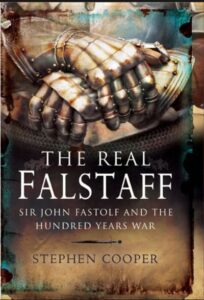 Anyone who has delved into Shakespearean studies probably learned that Falstaff was originally written as Sir John Oldcastle, Protestant martyr who was burned at the stake in Henry V’s reign. But Oldcastle had descendants who took exception to this unsavory depiction, and the great bard rewrote the part for the fat, cowardly, drunken braggart called Falstaff. Whether he intentionally named his character after the historical knight is up to interpretation, but the author has gone to great length to clear the name of Sir John Fastolf and demonstrate that he, too, has been misrepresented. Although there are similarities between the two:
Anyone who has delved into Shakespearean studies probably learned that Falstaff was originally written as Sir John Oldcastle, Protestant martyr who was burned at the stake in Henry V’s reign. But Oldcastle had descendants who took exception to this unsavory depiction, and the great bard rewrote the part for the fat, cowardly, drunken braggart called Falstaff. Whether he intentionally named his character after the historical knight is up to interpretation, but the author has gone to great length to clear the name of Sir John Fastolf and demonstrate that he, too, has been misrepresented. Although there are similarities between the two:
“They were both captains in the king’s wars, much involved in recruiting and mustering soldiers, including drunken soldiers. They were both associated with a Boar’s Head tavern (though Falstaff’s was at Eastcheap, Fastolf’s in Southwark). They may both have been pages to Thomas Mowbray, Earl (and later Duke) of Norfolk. Each man used forceful and colourful language (Fastolf in writing, Falstaff in speech); and each attracted devoted servants. Most importantly in terms of reputation, Shakespeare portrays both men as cowards. We shall see that, in the case of Fastolf, this was most unjust; but Falstaff does not for a moment hide his cowardice.”
Sounds convincing, doesn’t it? But once the first chapter is finished, the comparisons cease and Shakespeare is not mentioned again. This book is a full-bodied biography of Fastolf, who was a major player in the conquest of Normandy, especially after Henry V’s death. He was an important commander under the Duke of Bedford, regent of France (and brother of Henry V). Not only did he spend much of his life in service during the war, he acquired great wealth which he spent judiciously back in England. After Bedford’s death, his career spiraled downwards, and he was to live the rest of his long life a disappointed man in England. But he continued to serve Henry VI’s interests, though the king’s advisors rarely listened to his advice. He lost many of his French acquisitions during the fiasco under Somerset’s incompetent command. An unfortunate episode during the battle of Patay, where he left the field with his men when all was lost, cast a shadow over his reputation and dogged him until the end. This is undoubtedly one of the main reasons his name has been linked to Falstaff, and the author hopes to give us a more balanced portrayal. Although this is not the most exciting period of history to read about, the book moves right along and gives us a lot of good information.